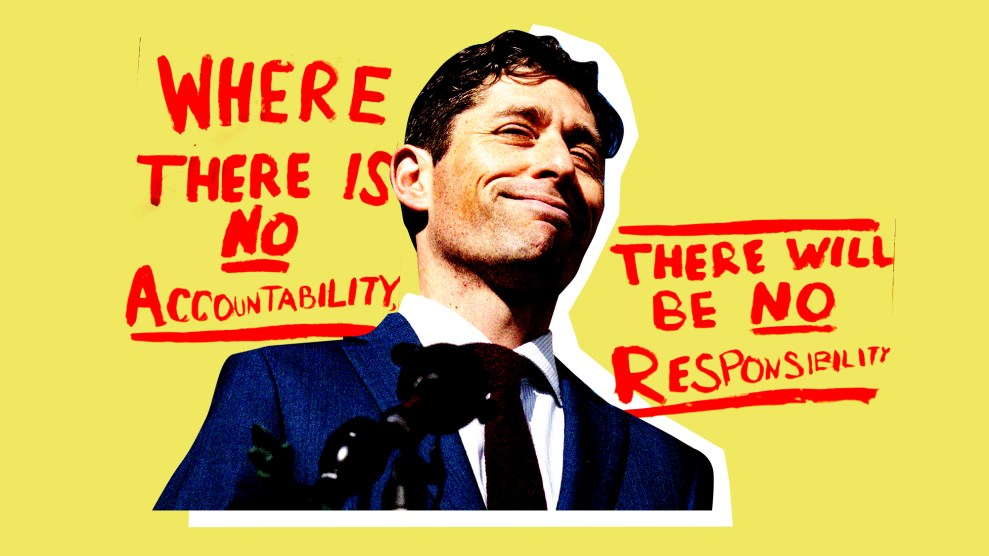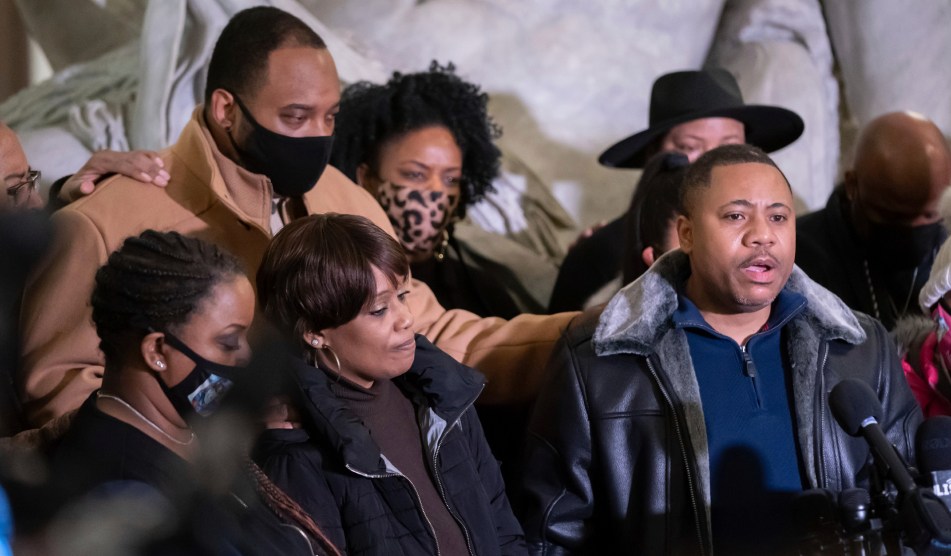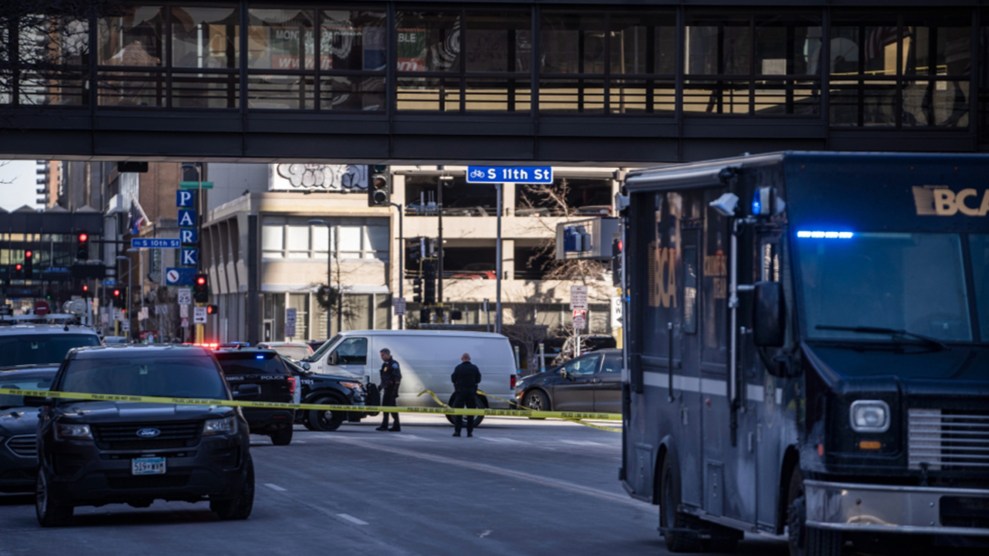
Mother Jones illustration; Alex Kormann/Star Tribune/AP, Chris Tuite/Sipa/AP
Last Friday Minneapolis mayor Jacob Frey announced a moratorium on no-knock warrants, the tactic that led to officer Mark Hanneman shooting and killing Amir Locke. It was the second time Frey’s announced a ban. And, for the second time, it was basically a lie.
During his re-election campaign in November 2021, Frey had said he’d stopped the practice—which also led to the death of Breonna Taylor in Louisville—only to admit later there was “complexity and nuance” to the restriction. Those nuances allowed 90 no-knock warrants to be requested within ten months of when the policy was announced in November 2020. Yet the complexities didn’t stop Frey from bragging about his “ban” in campaign flyers—to the extent even a Minneapolis city council member was surprised police were still conducting no-knocks. The asterisk this time? If Minneapolis police officers want to serve a no-knock warrant, “there must be an imminent threat of harm to an individual or the public and then the warrant must be approved by the Chief.”
For those outside of Minneapolis, this may seem surprising, scandalous, or new. It’s not. This is the Jacob Frey we have all seen for years now. His opportunism in the face of tragedy—as the world looked to our city to reckon with police violence across the nation after the killing of George Floyd—has been stunning. He has etched his own story (one being copied by centrist Democrats across the country) of a man standing athwart the radical activists ready to defund police, pushing through common sense police reforms that the community really wants. He is concerned about crime. He is a simple man trying to do a job. He wants to really listen.
National media has eaten this up. Looking for something other than defund, a middle ground, is the stuff puff-piece profiles in national magazines are molded on. In these stories, the fact Frey “shifted the rules around no-knock warrants” becomes that he “banned no-knock warrants”—until the tragedy of Locke’s killing shatters the concise narrative.
Following confirmation that officers were serving a no-knock warrant when they killed Locke, Frey’s achievement of “banning” no-knock warrants was scrubbed from the website of the Chamber of Commerce funded political action committee that supported his reelection. It was also deleted from his campaign website. (His staff insists it wasn’t in response to Locke’s killing). And Frey explained it was all miscommunication: “Throughout the campaign, certainly as more and more people and outside groups began weighing in, the language became more casual, including my own, which did not reflect the necessary precision or nuance,” Frey said. “And I own that.”
Let’s be clear: Frey lied, like he does all the time, because it suited him.
Frey’s lies have worked because since the uprisings of nearly two years ago, many have wanted a figure just like him. Twelve days after Floyd’s murder, millions watched Mayor Frey get verbally lambasted by protesters that had arrived outside his apartment. I was there. And, as I watched, I thought his days in office were numbered. What people outside of Minneapolis may have missed is how wrong I, and many others, ended up being. Frey was able to turn this event into a defining moment—even featuring it in campaign ads. Unlike the nine city council members who publicly agreed to dismantle the city’s police the very next day, Frey demurred. Almost all of the council members backtracked shortly on defund. Which made Frey appear resolute. This was a mayor who stood up to the city’s activist core and told them no. Public humiliation? Shame? Frey cast himself as someone who had values, and would not be swayed, but still showed up, even when it was hard.
Frey’s moment at the protest showed the people who really run a city (as my colleague Daniel Moattar pointed out) that he was a soldier for their interests. As the election season came into view, Frey positioned himself against a ballot initiative that would’ve amended the city charter to loosen the stranglehold the police have on Minneapolis. He campaigned, instead, in support of another charter amendment that would make him a “strong mayor,” granting him enhanced administrative authority throughout city government (the Minneapolis mayor already had unilateral control of the police department). Despite his boyish looks, this was pitched as a grown-up rolling up his sleeves and committing to the nuts and bolts of good governance. “It’s going to take a whole lot more than a magic wand,” Frey said in an interview. Here was a person supposedly uninterested in rhetoric, but, instead proposing real solutions.
As the pressure from the George Floyd protests faded, crime was also on the rise. The Chauvin guilty verdict had been claimed as a symbol of progress to cling to, which gave Frey latitude to begin an increasingly cynical reelection campaign. Alongside former Police Chief Medaria Arrondondo and a few enterprising public relations grifters, Frey brainstormed his pro-cop talking points behind closed doors. The phrase that emerged from the proverbial smoke-filled room, and defined his campaign, was “Both/And.”
Minneapolis can have both community safety in the midst of an upsurge in homicides and reform a police department under federal investigation by the Department of Justice with sensible reforms like banning no-knock warrants.
Yet, that didn’t happen. Frey gave platitudes to concerned residents and took to siding with the cops. In May, Frey called a press conference in North Minneapolis—the heart of the city’s Black community—to announce a piece of Both/And: a new community safety model to address gun violence in the area. He excluded two Black council members from the northside wards, who had criticized Frey’s overreliance on police as a dangerous quick-fix to a more complex problem. In June, he used his pandemic emergency powers to deputize a neighborhood security group. But it was to do the police’s bidding and clear out the memorial set up around the site of Floyd’s death colloquially known as George Floyd Square.
In the wake of two more deaths—when a U.S Marshalls task force shot and killed a Black man named Winston Boogie Smith Jr. in an uptown parking ramp (the same day the memorial was cleared) and a man drove his car through a makeshift street barricade and killed a woman protesting named Deona Marie Knajdek—Frey made it crystal clear where he stood. He gave condolences for what he called a “car accident,” but explained these protests were happening in a bustling shopping district right as the city was getting vaccinated and reopened for business: “We can’t have a major commercial corridor like this shut down,” he concluded.
Frey’s campaign played fast and loose with the facts. In September and October, Frey’s campaign misrepresented the positions of Senator Tina Smith and former Minneapolis Mayor Betsy Hodges on the public safety and strong mayor amendments as the same as his own, prompting each of them to publicly rebuke him.
All the while, Frey maintained that accountability for the cops who attacked protesters and residents during the George Floyd protests would soon come. Yet the only officers who have been formally punished since May 25, 2020 are Chauvin and his three accomplices currently facing federal civil rights charges. Oh, and a female officer who spoke to GQ to talk about the racism, sexism, and homophobia that was pervasive in the department. (She eventually quit.) There was also that high-ranking Black officer demoted for saying that if serious internal change wasn’t made, the department would keep hiring “the same old white boys.” (He’s now suing the department for racial discrimination.)
Frey’s Both/And has mainly been to be both cozy and close to the cops. Less than a week before the 2021 election, where voters were considering the ballot amendment that would’ve remade the police into a Department of Public Safety less reliant on armed police officers, there was another scandal. Chief Arradondo appeared in uniform, on the clock, for a press conference warning Minneapolis voters that the amendment would do nothing to improve policing in the city. It was a blatant violation of city ethics laws. More so, it was a ruse. Voters were sold repeatedly on Chief Arradondo as the perfect person to right the ship—a reform-minded Black police chief who had sued the department for racial discrimination as an officer. It wasn’t just to vote against the ballot measure that could reduce the police’s power in the city. It was that another solution offered itself: Arradondo and Frey said to let them figure this out. No need for the ballot measure. Yet once Frey won, that mirage ended. Arradondo announced his retirement shortly after the mayor was reelected and the public safety amendment was defeated. (After it would be of any consequence, Frey sent Arrandondo an official letter of reprimand for his press conference stunt.)
That is how Minneapolis found itself last Thursday night, when Frey and interim chief Amelia Huffman gave another emergency press conference about another Black man that their department had killed. Amidst demands for his resignation led by Ward 2 city council member Robin Wonsley-Worlobah and a citywide call for residents to file ethics complaints against him for lying, Frey hasn’t come to visit any of the marches or rallies throughout Minneapolis in the last week, where some protesters carried signs reading, “Frey Lied, Amir Died.” It’s understandable. Mayor Frey has been busy managing yet another crisis. But, as Justin Ellis pointed out in Defector, it’s a crisis he, more than anyone, should’ve seen coming.
As I wrote last week, the killing of Amir Locke is the result of a failure of policy, but the indictment of the Minneapolis police department should not be whittled into a debate that settles on the most humane way for police to bust through your door. Neighboring St. Paul has issued one no-knock warrant since 2016, and the police there still kill people with unnerving frequency. Minneapolis became globally infamous for anti-Black racism and police murder not because of just one policy, but because Derek Chauvin—who trained Minneapolis cops for a living—felt it within his right to choke the life out of George Floyd on the corner of a busy intersection in front of a crowd of people in broad daylight over a twenty dollar bill. Because cops believe they can do that, here and elsewhere.
In this moment it might be more productive to return to an uncomfortable truth that many residents learned during May and June 2020, when the police all but declared war on the citizenry. The department went rogue long ago, and there isn’t an elected leader or new set of rules that could magically reign them in. The killing of Amir Locke is the cost of doing business with an institution that functions like a protection racket. Two of Hanneman’s fellow officers in the raid that killed Locke were the same ones who patrolled the streets last summer—you can see them on bodycam footage indiscriminately firing marking rounds at people as they drive through the city in an unmarked van.
Many in the city will likely never believe Mayor Frey again. But he wasn’t really talking to many of us.
One of the only events Frey found time to speak at amid another racist policing scandal, was the annual meeting of the Minneapolis Downtown Council. He told the gala of business professionals that downtown would come roaring back in no time. He wants to get back to business as usual, normalcy.
Correction: An early version misstated the number of Minneapolis punished since the summer of 2020 and the specifics of how the “strong mayor” amendment altered the mayor’s power of the police department.

















